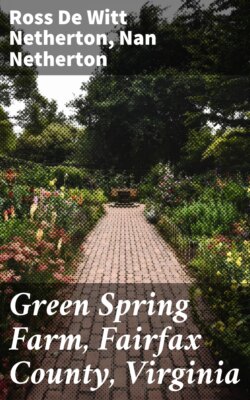Читать книгу Green Spring Farm, Fairfax County, Virginia - Ross De Witt Netherton - Страница 6
На сайте Литреса книга снята с продажи.
ACKNOWLEDGMENTS
ОглавлениеTable of Contents
These notes are part of a series of research reports on the historic and architectural landmarks of Fairfax County, Virginia, prepared pursuant to a resolution of the Board of County Supervisors calling for a survey of the county’s historic sites and buildings.
Green Spring Farm was selected in 1967 by the Fairfax County Historical Landmarks Preservation Commission as a subject to be researched, and was later incorporated into a successor research program sponsored by the Division of Planning in cooperation with the Fairfax County History Commission.
The authors of this report wish to acknowledge with special thanks the assistance of the following: Mr. and Mrs. John Mosby Beattie, Admiral Beverly Mosby Coleman, Mr. and Mrs. Michael W. Straight, Mr. and Mrs. John Quast, Mrs. Victor Fahringer, Mrs. Gwen Hempel, Mrs. Don Ritchie, and Mrs. Edith Moore Sprouse.
The authors also extend their thanks to the Honorable Thomas P. Chapman, former Clerk of the Fairfax County Circuit Court, and the Honorable Franklin Gooding, present Clerk of the Fairfax County Circuit Court, for assistance in making available court records of the clerkships of various members of the Moss family. The Honorable George R. Rich, Clerk of the Virginia House of Delegates and Keeper of the Rolls of the State, furnished information on Robert Moss’s term as a Delegate from Fairfax County. Thanks are extended to the staff of the National Archives who located and made available for examination the military and civil service records of Fountain Beattie.
Many helpful suggestions on the interpretation of data concerning the history of agriculture in Northern Virginia were provided by C. Malcolm Watkins, Chairman of the Department of Cultural History, and John T. Schlebecker, Curator of the Division of Agriculture and Mining of the Smithsonian Institution’s Museum of History and Technology.
Details of the architectural history of the mansion house were furnished by Walter Macomber, who was in charge of the 1942 renovation, and David Condon, AIA, who designed the additional work done in 1960. Mr. Condon also provided both information and architectural plans for the Tobey House and the Spring House. The authors’ sincere thanks are extended to both these gentlemen.
Finally, the authors wish to acknowledge the efficient and valuable help that they, as part of the county’s historical research project, received from the staff of the Fairfax County Headquarters Library.
N.N.
R.D.N.
Fairfax, Virginia
April 22, 1970
1
